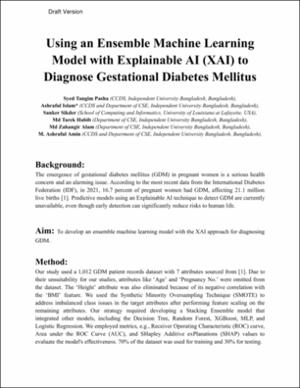Using an Ensemble Machine Learning Model with Explainable AI (XAI) to Diagnose Gestational Diabetes Mellitus

View/
Date
2023-10Author
Pasha, Syed Tangim
Islam, Ashraful
Sikder, Sanker
Habib, Md Tarek
Alam, Md Zahangir
Amin, M Ashraful
Metadata
Show full item recordAbstract
The emergence of gestational diabetes mellitus (GDM) in pregnant women is a serious health concern and an alarming issue. According to the most recent data from the International Diabetes Federation (IDF), in 2021, 16.7 percent of pregnant women had GDM, affecting 21.1 million live births [1]. Predictive models using an Explainable AI technique to detect GDM are currently unavailable, even though early detection can significantly reduce risks to human life. To develop an ensemble machine learning model with the XAI approach for diagnosing GDM. Our study used a 1,012 GDM patient records dataset with 7 attributes sourced from [1]. Due to their unsuitability for our studies, attributes like ‘Age’ and ‘Pregnancy No.’ were omitted from the dataset. The ‘Height’ attribute was also eliminated because of its negative correlation with the ‘BMI’ feature. We used the Synthetic Minority Oversampling Technique (SMOTE) to address imbalanced class issues in the target attributes after performing feature scaling on the remaining attributes. Our strategy required developing a Stacking Ensemble model that integrated other models, including the Decision Tree, Random Forest, XGBoost, MLP, and Logistic Regression. We employed metrics, e.g., Receiver Operating Characteristic (ROC) curve, Area under the ROC Curve (AUC), and SHapley Additive exPlanations (SHAP) values to evaluate the model's effectiveness. 70% of the dataset was used for training and 30% for testing. We achieved 85% accuracy with an AUC score of 0.91 in the experiment, and the ROC curve is shown as the performance curve in Fig. 1(a). The feature plot in Fig. 1(b) shows that the ‘Heredity’ feature is more important than the ‘Weight’ and ‘BMI’ features, whereas the summary plot in Fig. 1(b) combines feature effects and importance. Findings show that 'Heredity' has a high and positive impact on predicting GDM in this dataset whereas 'Weight' and 'BMI' have a positive impact but are lower than 'Heredity'. We developed an XAI approach-based ensemble machine learning model to diagnose GDM.
Collections
- 2023 [67]